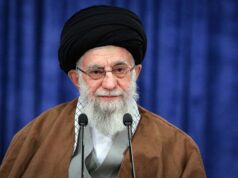The U.S. announced a plan late last week to sell Israel, Saudi Arabia, and the United Arab Emirates over $10 billion in military hardware. U.S. Secretary of State Chuck Hagel will negotiate the agreement’s final details and reaffirm Washington’s commitment to addressing Iran’s nuclear threat in a visit to the region this week.
Under the contract Israel will receive tilt-rotor V-22 Osprey, an aircraft that can take off vertically like a helicopter but fly at airplane speeds. Israeli officials looked at the Osprey in 2011 and could use it to fly special operations forces or conduct search and rescue missions. Jerusalem will also acquire KC-135 refueling planes capable of extending the range of Israeli fighters or bombers. The U.S. may also provide advanced anti-radiation guided missiles designed to target ground radar stations used for air defense systems.

U.S. Secretary of Defense Chuck Hagel looks at pictures of Jews killed in the Holocaust during a visit to the Yad Vashem’s Holocaust History Museum in Jerusalem, Israel, April 21, 2013. (Photo: AP) |
Arab allies in the region will also buy military hardware set to be worth more than $5 billion. The UAE would get 26 F-16 fighters and precision guided missiles. Saudi Arabia also expressed interest in the same precision guided missiles, which they could fit on their 84 F-15s, bought from a previous U.S. arms deal. But administration officials declined to disclose what class of missile would be sold, leaving one official to say the system would be able to help “address the threat posed by Iran.” Nevertheless, the use of such technologies would be subject to enhanced end-use monitoring by the U.S.
Hagel bluntly articulated how these assets could be used in the region. Assuring allies, he said, the sale is “not just to boost Israel’s capabilities, but also to boost the capabilities of our Persian Gulf partners so they, too, would be able to address the Iranian threat — and also provide a greater network of coordinated assets around the region to handle a range of contingencies.”
The secretary hopes the major arms deal will send a “very clear signal” to Iranian leaders over their country’s continued nuclear enrichment. Hagel reiterated that more time was needed to see if sanctions were working. However, Israeli officials, seeing a closing window to strike the Islamic Republic before it develops a bomb, refused to rule out a preemptive strike against Tehran. Hagle reaffirmed Israeli sovereignty and its “right to defend itself, to protect itself.” Even if Israel does attack Iran, the new weapons systems would take months or more to be delivered according to the AFP.





